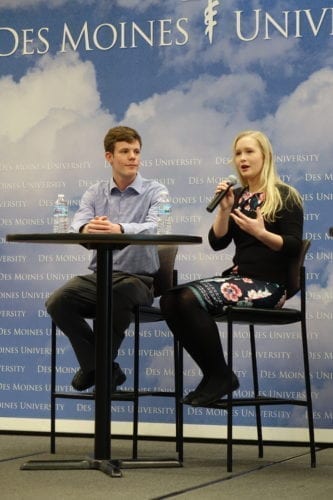
In February 2017, Edee Wildman, a second-year podiatric medical student at Des Moines University, wrote a post on Facebook about a bill proposed in the Iowa Senate that would define life as beginning at conception. The bill, Senate File 253, further stated it would create neither a right to an abortion nor a penalty on a woman who had one, but Wildman was skeptical. She wasn’t advocating for or opposing abortion with her Facebook post; rather, she wanted to encourage her fellow students to be aware and informed.
That compelled John Paul Sevchik, also a second-year podiatric student, to respond to the post. He had a hunch his views on the issue were different from Wildman’s, but he was interested in exploring that. Eventually, the two met over coffee.
“When we’re having these difficult discussions, it isn’t that we’re trying to tear each other down,” Sevchik said. “We’re trying to find common ground.”
“We didn’t want to just agree to disagree,” Wildman added. “We’ve found other issues on which we agree and disagree, and we’ve both learned in the process.”
Sevchik and Wildman were among the six DMU students who were featured speakers April 30 at “Opposing Views: Finding Common Ground,” part of DMU President Angela Walker Franklin’s discussion series. The six students paired up to talk about their approaches and experiences in holding civil discussions on issues on which they disagree. President Franklin moderated their discussions.

Osteopathic medical students Blaire Nasstrum, in her second year, and Jordan Allen, in his first, talked about the harm caused by labeling people and making uninformed assumptions about them. Second-year osteopathic medical students Austin Pillon and Ben Swob discussed the danger of getting into difficult conversations with an immediately hostile attitude. The two students met at a local pub early in their first year at DMU and soon were engaged in a lively discussion about Catholicism.
“We ended up talking even though we’re on opposite sides of the aisle,” Swob said.
“When Ben and I talk, I don’t feel like we’re playing political ping pong,” Pillon added. “I feel we’re able to put out our ideas and ask questions…You gain something more than just ‘winning the conversation.’ Learning is winning.”

